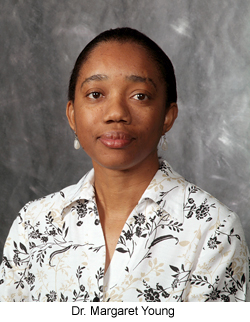Dr. Margaret Young receives Distinguished Service Award

Kesha Williams
July 03, 2012
Dr. Margaret Young, an associate professor in the Biology Department at Elizabeth City State University recently received the Distinguished Service Award from the Society for In Vitro Biology (SIVB). This award recognizes those, specially selected by the SIVB President, who have demonstrated and given extra effort in support of the SIVB programs and endeavors. She received the award while attending the 2012 World Congress on In Vitro Biology in Bellevue, Washington. The World Congress brings together SIVB as well as the Japanese Tissue Culture Association and the Japanese Society for Alternatives to Animal Experiments. Young was delighted to receive an award from the organization that is dedicated to the study and exchange of information relevant to biotechnology. "I am honored to have received this award from Bill (William Smith – President of SIVB). The Education and Student Affairs Committees are re-energized to carry out the mission of SIVB. This society has served me well throughout the past 15 years as it brings together my peers to discuss and advance the latest scientific discoveries in my field of plant biotechnology." "In my area of plant biotechnology, we are looking at ways of increasing crop production. Conventional (classical) breeding takes years to produce more efficient crops. Therefore, we need to harness all the technologies that are available." "We need to feed the estimated two more billion people expected by 2050 (from 7 billion now to 9 billion by 2050). In addition, based on climate change models, the world will be hotter and drier. Therefore, there will be less land that can be cultivated: -two problems are before us–drier and hotter conditions and more people needing food." Warmer temperatures, Young explained, could lead to a situation where current crops will not yield enough food to feed a larger population. "For example, there are a group of plants that can withstand higher temperatures (C4 plants), therefore, we need to understand how they evolved and try to engineer their type of photosynthesis in the major crop plants," Young said. "These are the challenges that today’s researchers and professors must prepare students to meet. After attending SIVB conferences, we are well prepared to discuss those issues with students and urge them to consider careers that will solve these problems." Dr. Young has been involved with the organization since 1997. The award recognized her outstanding contributions in support of the Society in her role as Education Committee Chair of SIVB. During her term, Dr. Young was instrumental in supporting the educational goals of the society by organizing a free interactive science workshop geared to high school and undergraduate educators during the 2011 In Vitro Biology Meeting. For this workshop, Dr. Young solicited local teachers for their participation, raised grant funds to support the event and worked with several educational science companies who donated their kits and provided demonstrations in plant and animal in vitro tissue culture to the participants. Young said colleagues, Dr. Ronald Blackmon, a senior research professor, and Mr. Moses McDaniel, a research associate in ECSU Biology Department, were also instrumental in this workshop. The SIVB’s Education Committee oversees all education-related events throughout the year and at the annual conference including oral/poster presentations, workshops and seminars. The Education Committee also works together with the Student Affairs Committee that plans all undergraduate and graduate students’ events. SIVB was founded in 1946 as the Tissue Culture Association to foster exchange of knowledge of in vitro biology of cells, tissues and organs from both plant and animals (including insects and humans). The focus is on biological research, development, and applications of significance to science and society. SIVB brings together experts in the academia and industry who are actively involved in improving plants and animals through biotechnology. The mission is accomplished through the Society’s publications national and local conferences, meetings and workshops and through support of teaching initiatives in cooperation with educational institutions. Over the years, SIVB has expanded to create an environment of scientific exchange and interdisciplinary synergy with the goal of advancing current and future systems for in vitro biology.

